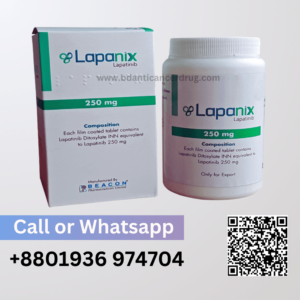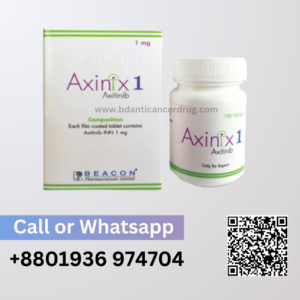Lenvaxen 4 mg and 10 mg (Lenvatinib)
Lenvaxen contains the active ingredient Lenvatinib is a cancer medicine that interferes with the growth and spread of cancer cells in the body. Lenvaxen is used to treat thyroid cancer. Lenvaxen is usually given after radioactive iodine has been tried without success.
Ingredients, registration number of brand-name drugs
Active ingredient: Lenvatinib 4mg, 10mg.
Specification: Box of 30 tablets.
Origin: Everest Bangladesh.
Drug registration number: Updating.
What are the uses of Lenvaxen? mechanism?
Lenvaxen contains lenvatinib which is a receptor tyrosine kinase (RTK) inhibitor. Drugs that selectively act on the kinase activities of the vascular endothelial growth factors (VEGF) VEGFR1 (FLT1), VEGFR2 (KDR) and related VEGFR3 (FLT4) RTK including fibroblast growth factor receptor (FGF) FGFR1, 2, 3 and 4, platelet-derived growth factor (PDGF) receptor PDGFRα, KIT and RET.
In addition, lenvatinib’s selective, direct antiproliferative activity in hepatocyte lines depends on activated FGFR signaling, is attributed to lenvatinib’s inhibition of FGFR signaling.
Although not directly studied with lenvatinib, the mechanism of action (MOA) for hypertension is thought to be mediated by inhibition of VEGFR2 in vascular endothelial cells.
Similarly, although not directly studied, MOA for proteinuria is required to be regulated by upregulation of VEGFR1 and VEGFR2 in glomerular cells.
Dosage and how to use Lenvaxen 4?
- Dosage for HCC: 12 mg orally, once daily (for adults weighing > _60 Kg). 8 mg orally, once a day for adult weight
- Treatment of differentiated thyroid cancer : 24 mg orally, once a day
- Treatment of kidney cancer : 18 mg lenvatinib + 5 mg everolimus, orally, once a day.
In patients with severe renal or hepatic impairment, the dose is 14 mg once daily in thyroid cancer and 10 mg once daily in renal cancers <60.
Lenvaxen 10 . side effects
The most common side effects of Lenaxen in people being treated for thyroid cancer include :
1. fatigue 2. muscle aches and pains 3. weight loss
4. sore throat 5. stomachache 6. stomachache
7. loss of appetite 8. nausea 9. headache
10.Redness, itching or peeling skin on your hands and feet 11. Hoarseness
The most common side effects of Lenvaxen in people being treated for kidney cancer include:
- 1. fatigue 2. loss of appetite 3. nausea
- 4. swelling in your hands and feet 5. stomach (abdominal) pain 6. rash.
- 7. pain and muscle pain 8. causes sores
- 10. cough, 11. difficulty breathing 12. weight loss.
Lenvaxen can cause fertility problems in men and women.
Drug interactions
Lenvatinib can cause a serious heart problem. Your risk may be higher if you also use certain other medicines for infections, asthma, heart problems, high blood pressure, depression, mental illness, cancer, malaria, or HIV .
Other drugs may affect lenvatinib, including prescription and over-the-counter medicines, vitamins, and herbal products.
Tell your doctor about all your current medicines and any you start or stop using.
Tell your doctor if you have ever:
- heart disease, high blood pressure;
- heart attack, heart failure, stroke, or blood clot;
- headache or vision problems;
- bleeding problems;
- perforation (a hole or tear) in your stomach or intestines;
- seizure disorder;
- kidney disease; or liver disease.
You may need to have a negative pregnancy test before starting this treatment. Do not use lenvatinib if you are pregnant. It can harm an unborn baby.
Use effective birth control to prevent pregnancy while you are using lenvatinib and for at least 30 days after your last dose.





